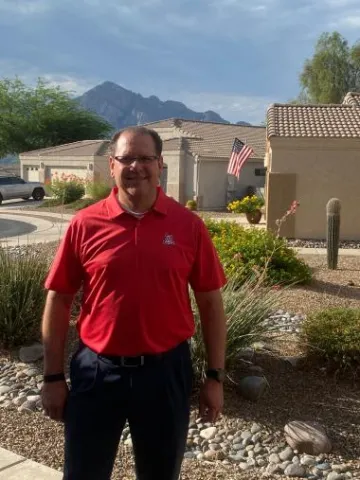Changing the Way We View Success
To Dr. Alex Ramirez, success means deciding to follow opportunities to make an impact and embracing a positive attitude no matter what the outcome.

To Dr. Alex Ramirez, success means deciding to follow opportunities to make an impact and embracing a positive attitude no matter the outcome. Growing up in Mexico, Ramirez had plenty of dreams, but becoming a veterinarian was not one of them. Despite his interest in science, medicine, and animals, he had not considered pursuing veterinary medicine until an academic advisor nudged him in the general direction and opened a world of possibilities. “Sometimes, advisors or faculty members [ignite a] spark in you to think outside the box and consider paths you otherwise might not have taken,” Ramirez said of his choice. At the age of 18, Ramirez chose to pursue his opportunity to study veterinary medicine and enrolled at Iowa State University. This formative choice opened the door to an exceptional professional career, and now, his road to opportunity has led to a position as Senior Associate Dean of Academic Programs and Faculty Affairs at The University of Arizona’s College of Veterinary Medicine, where his vision is shaping the definition of faculty and student success.
Ramirez first heard about the University of Arizona College of Veterinary Medicine while volunteering for the AVMA Council on Education. While participating in a site visit for Arizona’s accreditation application, Ramirez could not help feeling intrigued by the freedom afforded to a new college to innovate, plus, “the opportunity to help mold the program from the beginning.” Long-established veterinary programs can be challenging to restructure to meet new generational or educational needs, and the College of Veterinary Medicine’s vision and direction was an opportunity to play an instrumental role in structuring the program and tailoring it to achieve the unique, specific goals of the college. So, when the door opened to become a part of the program, he leaped in with both feet.
The College of Veterinary Medicine has built its curricular model around a student-centered program designed to produce day-one-ready practitioners. For Ramirez, the root of success for our students comes down to education and teaching. “Happy faculty means happy students. Like any relationship, we all have to be working together. . .We are always asking, ‘How will this improve student learning?’” One example of how the college is improving student learning is by empowering faculty in their areas of expertise. Ramirez is a big proponent of supporting and encouraging teaching faculty to focus on their efforts in the classroom. “Faculty directly interact with students, so they act as role models for the profession,” Ramirez said. Faculty are the first touch in our program and exemplify the passion and professional traits needed in veterinary medicine. Supporting faculty and enabling them to succeed in the classroom telegraphs the value of our students' success in the career they love.
Success is unique to each student, Ramirez said, but there are several themes he thinks of when he plans for success at CVM.
“When our graduates are out in practice and recognize the value of what they learned here, that is success. Tied to that is confidence,” he says. “Our program teaches skills like communication, clinical skills, and working in teams, which are not always taught in vet school . . . [but] are critical in practice. Our students gain experiences that prepare them for their clinical rotations.”
For students to achieve this, faculty and staff work to thoroughly prepare and provide them with as much real-world expertise as possible. Students are challenged and learn valuable skills, but Ramirez wants to ensure “students and faculty want to come to school” as he believes the value of a challenge is lost when students or faculty reach a point of burnout or of questioning their veterinary pursuits. Creating a healthy symbiotic relationship between faculty and students will produce empowered future leaders who chase possibilities and make tangible impacts in their communities.
Over the course of his career, Dr. Alex Ramirez has practiced veterinary medicine, taught veterinary students, and exercised his expertise to guide academic programs and faculty affairs. Ramirez has experienced all sides of veterinary medicine and understands which ideas are key for conceptualizing success. Openness to change and new opportunities can uncover unexpected paths, as he experienced in his educational journey. Focusing on what a person has control over also helps illuminate where opportunities exist. His advice is to “focus on the things you have control over and think positively [about the opportunities within.] See the negatives and think, ‘Yes, but I can make a difference.’” Ramirez exemplifies his goal for faculty to ‘lead by example’ by maintaining a positive outlook on new ideas, cultivating opportunities, and focusing on what brings him joy in veterinary medicine: making a real impact on animal health and experiencing the satisfaction of making a positive difference.
